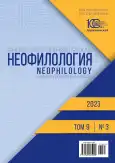Logical-semantic analysis of contrast (based on English economic terms)
- Authors: Shakiryanov L.M.1
-
Affiliations:
- Bashkir State University
- Issue: Vol 9, No 3 (2023)
- Pages: 553-560
- Section: LANGUAGES OF PEOPLES OF FOREIGN COUNTRIES (GERMANIC LANGUAGES)
- URL: https://journal-vniispk.ru/2587-6953/article/view/295730
- DOI: https://doi.org/10.20310/2587-6953-2023-9-3-553-560
- ID: 295730
Cite item
Full Text
Abstract
The study is based on English economic terms and is devoted to the logical-semantic analysis of contrast according to the following language criteria or elements: relationship type, nomination type, implementation method, word-formation properties, syntactic potential, part-ofspeech, lexical-semantic features, combinatorial function. The theoretical significance of the study lies in determining the role of counterdiction at the language and psychology science intersection. The goal of study is a comprehensive theoretical and practical study of the properties of the difference between the economic terms of the English language. To achieve this goal, it is supposed to describe the history of antonymy in linguistics from its origin in order to streamline semantically contrasting (opposite and opposed) units to development to the phenomenon of absolute linguistic and speech universals. Within the framework of this approach, it is necessary to cover the origin of the principle of antonymy based on the phenomenon of oppositions, work on the classifications of antonyms, the use of semantic criteria in the study of the phenomenon, component analysis of opposites, their definitions; also touch upon the research on antonymy, which considers not only the phenomenon itself, but also related concepts, modern studies of contrast. The period from oppositions to the present, covering several centuries, culminated in the emergence of criteria, or elements of a logical-semantic analysis of semantic incompatibilities.
About the authors
L. M. Shakiryanov
Bashkir State University
Author for correspondence.
Email: levshakiryanov@gmail.com
ORCID iD: 0000-0002-3110-8271
PhD (Philology)
32 Zaki Validi St., Ufa, 450076, Republic of Bashkortostan, Russian FederationReferences
- Trubetzkoy N. Grundzüge der Phonologie. Travaux du cercle linguistique de Prague, 1939, no. 7, pp. 706-712. (In Ger.) https://doi.org/10.1007/978-94-017-6059-1_32
- Apresyan Yu.D. Leksicheskaya semantika. Sinonimicheskie sredstva yazyka [Lexical Semantics. Synonymous Language Means]. Moscow, Nauka Publ., 1974, 367 p. (In Russ.) https://elibrary.ru/pwfjrv
- Maksimova I.V, Shpal’chenko E.P. Lexicographic typology of terminological dictionaries: a cognitive vector of development (on the basis of terminological dictionaries of the Russian, English and French languages in the subject area “military aviation”). Filologicheskie nauki. Voprosy teorii i praktiki = Philology. Theory & Prac-tice, 2023, vol. 16, no. 2, pp. 615-623. (In Russ.) http://doi.org/10.30853/phil20230081, https://elibrary.ru/fwhroi
- Zdanovskaya L.B. Specifics of representation of conceptual opposition in the aspect of political discourse con-sideration (by the example of the dichotomy созидание/creation – разрушение/destruction in the Russian and English languages). Filologicheskie nauki. Voprosy teorii i praktiki = Philology. Theory & Practice, 2023, vol. 16, no. 3, pp. 901-906. (In Russ.) http://doi.org/10.30853/phil20230104, https://elibrary.ru/qjuqqs
- Tyumeneva E.I. Gender antithesis in Vietnamese phraseology. Vestnik Moskovskoi mezhdunarodnoi akademii [Bulletin of the Moscow International Academy], 2017, no. 1-2, pp. 72-81. (In Russ.) https://elibrary.ru/zefwpx
- Osipenko T.A. Realisation of the concessive construction zwar …, aber … in oral doctor-patient communi-cation. Filologicheskie nauki. Voprosy teorii i praktiki = Philology. Theory & Practice, 2023, vol. 16, no. 4, pp. 1181-1186. (In Russ.) http://doi.org/10.30853/phil20230193, https://elibrary.ru/pkslcl
- Rudi A.Sh. The language in communication algorithms of conflict resolution. Tsennosti i smysly = Values and Meanings, 2010, no. 6 (9), pp. 40-47. (In Russ.) https://elibrary.ru/nuqdyx
- Vysotskaya I.V., Prom N.A., Iovanovich T.G., Alekseenko N.V. Figures of contrast in the media text (as based on the material of the German and Russian languages). Sovremennye issledovaniya sotsial’nykh problem = Modern Studies of Social Issues, 2019, vol. 11, no. 1-1, pp. 78-94. (In Russ.) http://doi.org/10.12731/2077-1770-2019-1-78-94, https://elibrary.ru/gauxfw
- Bochina T.G. Contrast in Tuvan proverbs. Novye issledovaniya Tuvy = The New Research of Tuva, 2022, no. 1, pp. 37-46. (In Russ.) https://doi.org/10.25178/nit.2022.1.3, https://elibrary.ru/julski
Supplementary files









